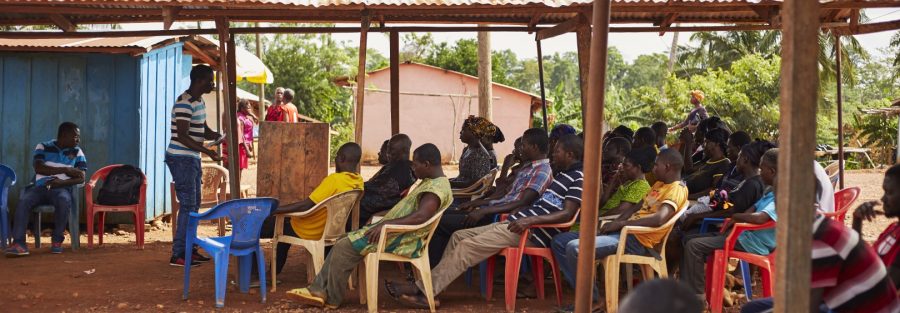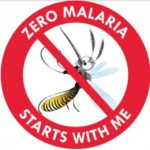Ghana is classified as being in the malaria control phase according to the Global Malaria Elimination Program. However, in 2016, Ghana recorded 10.4 million suspected malaria cases in its outpatient departments which denotes a 2.5% increase compared to same period in 2015. Conversely, there was a reduction in the number of malaria attributed deaths from 2,137 in 2015 to 1,264 in 2016 representing a 40.9% reduction. The continual reduction in malaria deaths is challenged by inadequate human resource and logistics supply, poor supervision and inadequate community involvement in data collection that is required to monitor the process of malaria control.
The incidence of malaria still accounts for 30% of all outpatient attendance with the most vulnerable groups being children under-5 years of age and pregnant women. If malaria is to be eradicated, it is imperative that malaria service delivery be improved by the sustained participation of community members and other relevant key stakeholders in developing contextualized solutions. As Ghana makes progress towards achieving Universal Health Coverage, there is a need for data that is relevant and context specific to support policies and programmes to make healthcare more accessible to Ghanaians.
ARHR is implementing the “Bridging Gaps, Innovate for Malaria (B4M)” project- a project that uses social accountability approach to strengthen the health system particularly at the sub-national level. The aim of this project is to build the capacity of individuals communities to demand quality malaria services, generate evidence on service delivery gaps using malaria as an entry point and advocate for improved service quality at both national and sub-national levels. .
The community scorecard is an evidence generation tool that empowers community members with the ability to provide feedback in a transparent and structured manner that encourages action and accountability. By pulling out the gaps in malaria service delivery, it provides health care service providers a direct link to their community as the scorecard collects information that can be used by service providers to improve service delivery specific to their community. The strength of this scorecard process lies in its emphasis on an immediate response to the gaps and collective action by all stakeholders to redress the gaps identified.
Furthermore, it strengthens existing social accountability systems at the community level by empowering community members to voice the challenges they face at their local health facilities. More often than not, there are gaps in communication between community members and their health providers. So, the community scorecard gives service providers the opportunity to engage with community members on possible solutions to their challenges based on data generated from both the facility and community members.
Using the community scorecard approach, ARHR under the B4M project assessed 20 health facilities in four districts in the Western Region of Ghana on their readiness to implement approved standards and protocols for malaria management. The districts were Mpohor, Nzema East in the Western Region and Juaboso and Bodi in the Western North Region. The facility assessments covered issues of access, staffing, infrastructure for client care, hygiene conditions and essential equipment and drugs for malaria. The client assessments were administered through exit interviews and sought the perspectives of clients/community members on accessibility, access to information on malaria and client provider interactions.
Following the data collection in the districts, a thorough analysis of the data was conducted and the scorecards were produced and used to engage specific stakeholders at the district and national levels through multi-stakeholder interface meetings. This included the National Malaria Control Program, the Ghana Health Service Family Health Division, Institutional Care Division, the Western Regional Health Directorate, District Health Directorates and the District Assemblies. The engagements required community members, health providers and decision makers to address the gaps identified by the scorecards and mutually generate solutions. These meetings acted as a forum for all stakeholders to identify and understand their individual roles in ensuring that malaria service delivery is improved in their districts.
Since the engagements on the community scorecard results, there have been significant milestones in enhancing malaria service delivery in these districts. The meetings proved to be very useful as ARHR has recorded some significant improvements in malaria service delivery in these districts. There are now strengthened partnerships at the sub-national level for improved malaria service delivery. ARHR has recorded evidence that shows staff of the DHMTs are using the results from the assessment to strengthen their health systems. In terms of service delivery, facilities which did not have basic equipment like ventilation bags, weighing scales for babies and BP apparatuses have been provided by the DHMTs. Stock outs of other essential malaria inputs such as RDTs and ACTs have reduced considerably. Specifically, the Mpohor District Assembly has provided the district with a borehole water system to enhance sanitation and hygiene at the facilities. There has also been intensified community education on health rights and responsibilities, malaria prevention and control as well as the malaria service package.
Similarly in Juaboso and Bodi, the B4M project has revived some dormant Community Health Management Committees which were set up to ensure community-level participation and accountability in health service delivery. These committees now serve as forums for information sharing, coordination and monitoring of community level scorecard action plans to ensure responsive and accountable health service delivery at the facility and community levels. Moreover in these districts there have been significant improvements in service delivery, human resources for health, governance and accountability as well as medicine and essential medicines for malaria prevention and management.
Most importantly, community members are better equipped with information on malaria and what it means to demand for quality health care. They have been empowered through the community scorecard process to actively engage in decision making and hold decision makers accountable.
The community scorecard approach is effective in improving malaria service delivery because it provides evidence for context specific solutions. This allows community members and health facilities to engage each other on the challenges both parties face in malaria service delivery whilst also creating a platform for them to mutually generate solutions and hold each other accountable.
Sources:
Awine, T., Malm, K., Bart-Plange, C., & Silal, S. P. (2017). Towards malaria control and elimination in Ghana: challenges and decision making tools to guide planning. Global health action, 10(1), 1381471. https://doi.org/10.1080/16549716.2017.1381471
National Malaria Control Programme (2018) 2017 Annual Report: Ghana Health Service
Alliance for Reproductive Health Rights (2017) A BASELINE SURVEY OF BRINGING GAPS: INNOVATE FOR MALARIA: A STUDY CONDUCTED IN FOUR DISTRICTS OF THE WESTERN REGION



